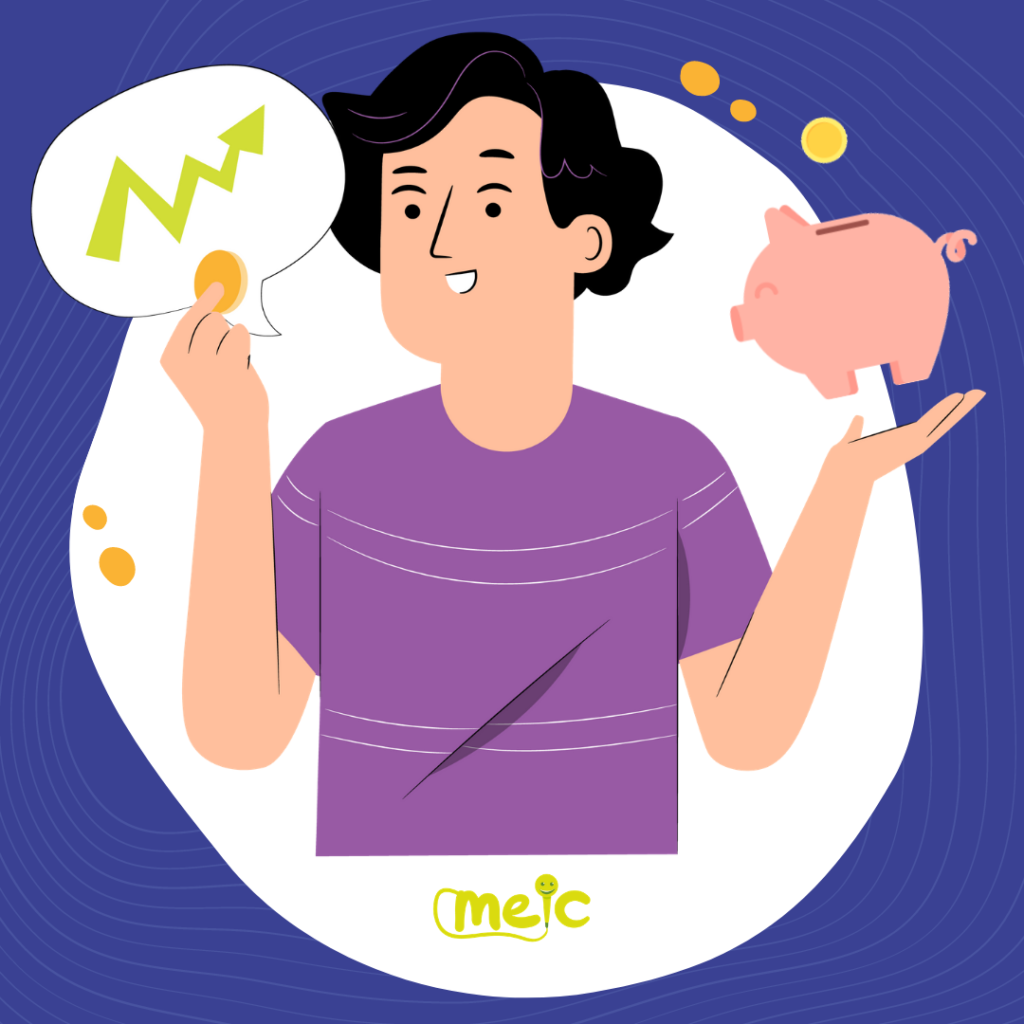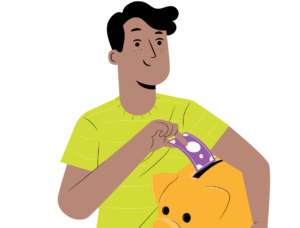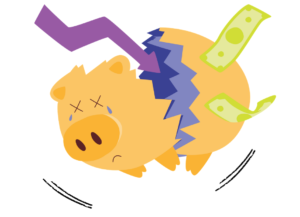Good Debt, Bad Debt and Getting Help

As part of our Cost of Living Crisis Campaign we take a look at debt – what it is, who it happens to, what good and bad debt is, how to borrow safely and what to do if your debt gets out of control. Here’s our guide to all things debt related.
I ddarllen yr erthygl hon yn Gymraeg, clicia yma
Debt is something (usually money) that has to be repaid to the person or organisation that loaned it to you in the first place. You usually have to pay back an extra cost on top of the amount you borrowed for the privilege of being lent the money in the first place.
For example, your brother might lend you £10 for a month. At the end of that month he wants £12 back – a thank you to him for lending you the money! That might sound a bit mean of your brother, but when it comes to organisations that nearly always happens. You will usually pay extra back to them, and this is often a lot more than a couple of pounds.
Who has debt?
Anybody could have debt. There isn’t a particular type of person that gets into debt. In fact it’s very few people that go through their whole life without needing to borrow money.
Even super famous people, who you imagine have plenty of money, probably have debt. Yes, they can go clothes shopping or buy a new car without getting into debt maybe, but they might not have $30 million in the bank to buy themselves that new mansion in L.A. It’s likely that they would need to borrow money from the bank (mortgage) too.
What is good debt and bad debt?
Debt can be split into two types, good debt and bad debt. It’s important to know which is which – knowledge is power!
Good debt
Some types of debt are not bad. These types of debts can help you develop and earn more money, with which you can pay the debt back. Most people wouldn’t be able to pay for the following ‘good debts’ upfront. They would need to borrow money to be able to move forward and improve their lives and prospects.
- Student finance – when you go to University you can claim student finance. This helps you get good qualifications that could lead to a good job. This will help you pay back the loan
- Buying a car – this could help you get to work. It might be essential that you have your own car for a job. This means getting a wage with which you can pay back the loan
- Getting a mortgage – borrowing money from the bank to buy a house. Generally house prices increase over time, so a house bought for £100,000 might be worth £120,000 in 10 years. A bank is fairly confident to lend you money to buy a house (if you can afford the repayments); if you are not able to pay back the mortgage then they will still have the house.
- Investing in your business to help it grow – this type of lending can lead to the business growing. This can increase your income in the short term, and make your business worth more in the long term.
Bad debt
This kind of debt doesn’t help develop you or increase your chances of making more money. Things could spiral out of control and you find it hard to pay back your loan. This can have a negative effect on your life and health. Here are some examples and what could happen if things go wrong.
- Paying for an expensive holiday on a high interest credit card – the interest on top of what you borrow could mean you struggle to pay back the amount you’ve borrowed. Not being able to pay back a credit card could put a black mark against your name for future borrowing. This is called bad credit. Perhaps you wouldn’t be able to afford something essential later on, like needing a car for a job.
- Buying a brand new car that you don’t need but want because it looks nice – make sure you can afford the repayments and consider what would happen if your situation changed (like losing your job). As new cars lose their value the minute you drive them away from the garage, if you needed to sell the car to get your money back to pay off your loan, you wouldn’t get the full amount you needed.
- Taking out a payday loan to help with day-to-day bills – taking out a payday loan to pay your gas, electric, rent, food etc. is a slippery slope into further debt. Payday loans usually have high interest rates, meaning you’ll have to pay back a lot more than you borrowed. It can mark you as an irresponsible borrower too, which means you could struggle to get a loan from the bank in the future. If you’re struggling to pay your bills, speak to someone who can help you with your situation and find a way forward. Organisations like the CAB can help if you’re struggling to pay your bills. You can figure out affordable payments plans with your energy suppliers and see if you’re eligible for any benefits.
How can I borrow money safely?
Most people will need to borrow money at some point in their life. It really is a normal part of life. However, credit (the money you borrow) MUST work for you, and not against you.
Follow these top tips so that you stay in control of your debt rather than it controlling you!
1. Shop around to get the best deal when buying something
2. Borrow the money as cheaply as possible. The lowest the APR (annual percentage rate) number, the better. Sometimes you can get 0% APR deals that means you won’t pay any interest on top of what you borrow for the length of time specified in the deal
3. Think about how you would pay if interest rates rise in the future
4. Consider whether borrowing the money will improve your finances in the long term. Like buying a car to get a better-paid job
5. Understand the risks – what would happen if things go wrong (like loosing your job)?
6. Understand the terms and conditions of borrowing the money – sometimes you can borrow money interest free, but there will be conditions. If you don’t stick to these then you could lose the interest free benefit
7. Have a plan/budget – none of us have money trees growing in the garden sadly. It’s vital to know what you have to pay and when. Not sticking to the agreement you’ve agreed to can lead to trouble and this could have a devastating effect on you going forward
What can I do if my debt is out of control?
People can become overwhelmed by their debt. It can have a devastating effect on your mental and physical health. It can cause depression, anxiety and sometimes suicidal thoughts, that could lead to drinking, drugs, risky behaviour and not taking care of yourself, that can cause more serious long term illnesses.
If you find that debt is having an effect on your mental or physical health then talk to your GP. They can support you and find the help that you need.
The Coronavirus pandemic has shown how things can change very quickly. People can lose their jobs and income, become ill and sadly die, perhaps leaving their loved ones struggling financially.
If your debt is causing you sleepless nights then it’s a good sign that you need help. This is nothing to be ashamed of and the sooner you get that help the better. It’s unlikely that the situation is going to be solved without support.
Where to get help
There are lots of FREE specialist debt organisations that you can contact for support. If they are asking you to pay for their services then DON’T – you should never need to pay. The free services will provide you with all the support you need to get back on top of things.
- Money Helper is a free and impartial service. They offer advice and guides on their website and on the phone. There are also some great online tools and calculators that help keep track of your spending. They can provide you with contact details for a variety of free online, telephone and face-to-face debt advice services. Click here to find some of the services they recommend.
- Step Change is a debt charity with lots of free debt advice and information on their website. You can get help online and they’ll recommend the best solutions and services for your circumstances and support you for as long as you need them.
- Meic is an information, advice and advocacy helpline for children and young people in Wales up to the age of 25. If you’re worried and want to talk about this further, one of our advisers can talk you through what you need to do and can help you make contact with the services that can help. Get in touch confidentially, and free, anytime between 8am and midnight every single day, by phone, text or online chat.
- Apps and Websites to Help With the Cost of Living – Meic blog























